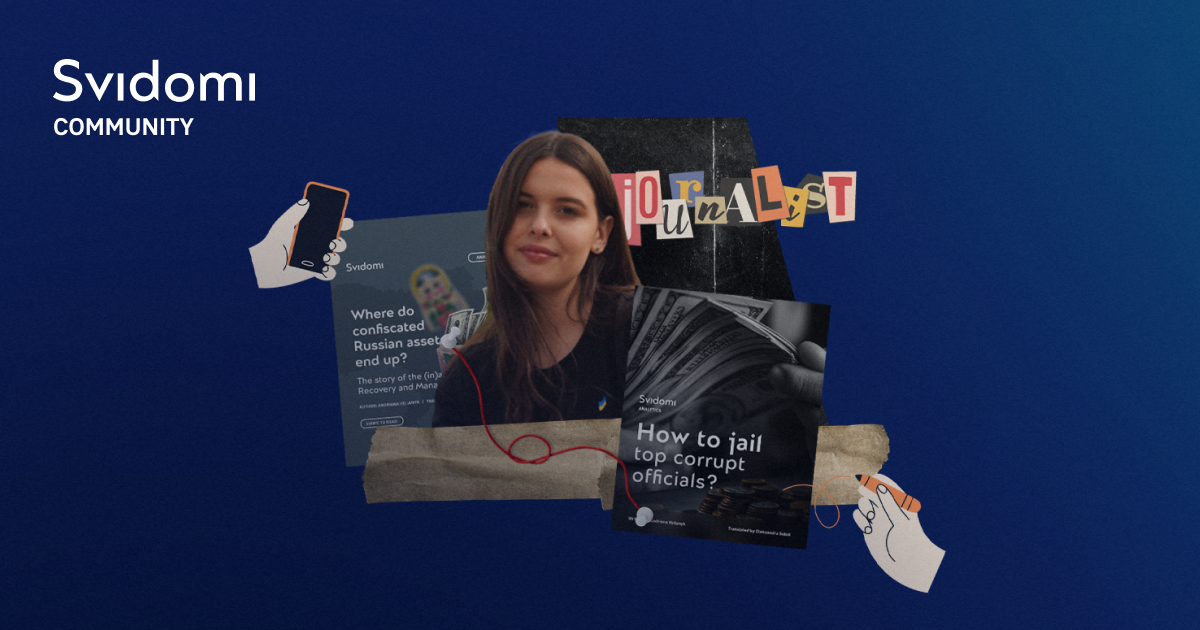How Svidomi writes about corruption

After my first year at university, I started working for a company that was doing media analysis. That's how I began to work with the topic of corruption — first as an analyst and now as a journalist.
Before this job, all I had known about corruption was that "Ukraine is a corrupt country" and "there are dozens of politicians and oligarchs that will never be jailed." I suppose that some of the foreigners think the same. Some of them may be among our readers.
Much of the news I read to prepare media analytic reports was about the fight against corruption in Ukraine. Then, at the age of 18, I discovered that there are specialised anti-corruption institutions.
There are detectives and prosecutors that work only with corruption crimes, and there are even (then newly created) the High Anti-Corruption Court of Ukraine formed in partnership with foreign experts.
Step by step, I read about how these institutions work, googled the loudest corruption cases, recognised key representatives and speakers, and followed the news on these topics. At university and other courses, I learned how to use state registers, read legal terms, and find original sources.
After the beginning of the full-scale war, my company stopped working for a while. I joined Svidomi as a volunteer and spent nights writing the news.
No one talked about corruption. It was absurd to do it when Russia threatened the existence of the country. The priority was a fight against an external enemy. A lot of journalists have turned to self-censorship to avoid helping the aggressor and giving reasons for Russian propaganda to work against Ukraine.
However, the Ukrainian military quickly showed that Ukraine had someone to protect it. The country, the capital of which was planned to be seized in three days, has been defending during a full-scale invasion for more than 600 days. That is why the fight against those who harm the state from within has become increasingly urgent.
Former European Commission President Jean-Claude Juncker, in October 2023, said: "Anyone who has had anything to do with Ukraine knows that this is a country that is corrupt at all levels of society."
A month before he made this statement, more than 83,000 Ukrainians signed a petition to the President of Ukraine demanding to disclose the declarations that show officials' property.
The people did it in less than two days. The petition was registered by a military man. A week later, Volodymyr Zelenskyy complied with their request. Not so bad for a "corrupt society", is it?
Ukraine is now a country where food for the military was overpriced and where the Supreme Court Chief Justice was caught red-handed for taking a bribe, as well as the mayor of Sumy — a northeastern city of Ukraine located nearly 30 kilometres from the border with Russia, which Russian troops tried to encircle at the beginning of the full-scale invasion.
At the same time, Ukraine is a country that established anti-corruption institutions after the war began in 2014; it is a country where every citizen can see purchases of state institutions on the Prozorro website; it's a country where even during the big war reforms are being implemented, and people are looking for ways to show that they do not agree with corruption.
Millions of dollars, euros, and tonnes of goods are coming to Ukraine as aid. It's fair to have the fear that they may be stolen. So, we are in a situation where corruption is one of the threats to the resistance of the nation. Journalists no longer follow the rule "don't harm" (read as "don't discredit the country").
Because exposing corruption doesn't hurt, but corruption itself does.
At Svidomi, my colleagues and I cover corruption scandals; I write articles showing flaws in the law that make it hard to jail top corrupt officials or demonstrate how the Ukrainian government sometimes doesn't want to fight corruption but rather shows off. I show how Ukraine implements reforms and why managing arrested Russian assets is ineffective.
When I write about complicated topics, I keep two images in my mind: my friends, who know no more about politics and corruption than I used to know before I started my career, and my grandparents, who often don't read more than the headlines. I think about how to make my articles clear and exciting for both.
My main goal is to live in a society that doesn't think that politics is complicated and doesn't stay away from it; that doesn't forget and doesn't forgive corruption crimes and doesn't tolerate corruption in schools, hospitals, with the police, and in official institutions.
I'd be lying if I said I wanted to do an influential investigation and uncover significant corruption. I want to fail in all my research because there would be no corruption.
We don't want to hide corruption or show it in a less critical light. Our goal is to talk about it to stimulate changes and to remind people of the progress we've already made.
Follow Svidomi and join our community on Patreon if you want to stay informed about corruption and domestic politics in Ukraine.


